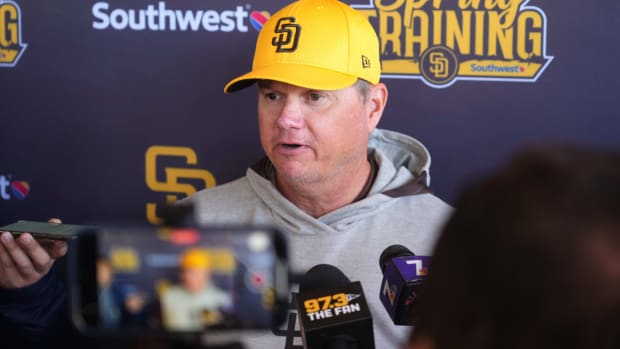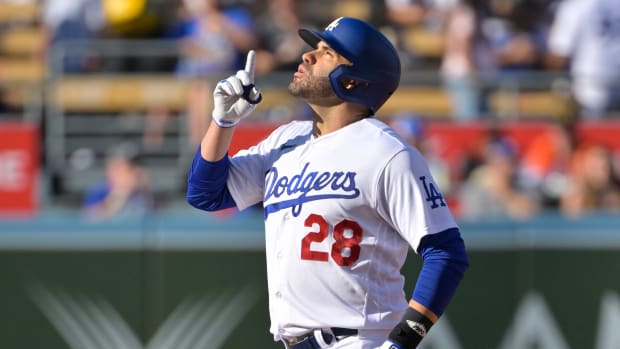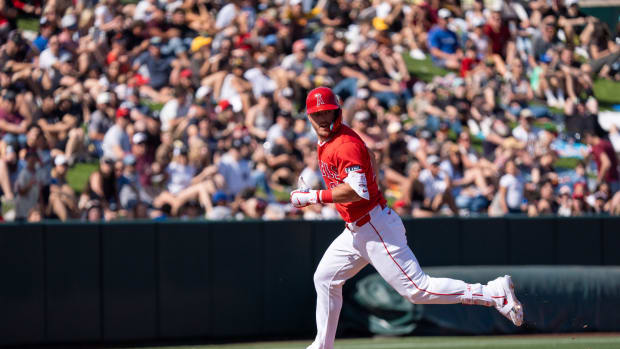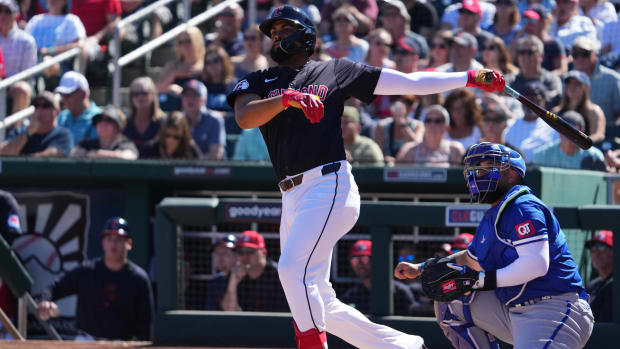Three Strikes: Mets' mission; speak up, umps; are Rangers new Red Sox?
Even after taking a 2–1 series lead on the Dodgers in the NLDS, the Mets knew that in order to win, they would have to get through either the best pitcher on the planet or the best pitcher this year. Having been Kershaw-ed in Game 4 on Tuesday, here's what they now must do: beat Zack Greinke in Los Angeles, where he has started 18 times this year and never had a bad game. Good luck with that.
You have to go back to Greg Maddux in the mid-1990s to find another starting pitcher who was as on point in almost every start all season as Greinke was this year. He has been particularly sharp at Dodger Stadium: Greinke has allowed 21 earned runs in 18 home starts, including Game 2 against New York. He is 11–1 with a 1.52 ERA at Dodger Stadium this year (Los Angeles is 14–4 in those 18 Greinke games) and has never allowed more than three runs or pitched fewer than six innings.
NLDS Game 5 preview: deGrom, Mets face Greinke, Dodgers for NLCS berth
The Mets’ best plan of attack is to wear him down rather than to beat him outright; make this a bullpen game by being the rare team to make Greinke work. Greinke may be among the most precise pitchers in the game, but he’s not the workhorse that is Clayton Kershaw; he has thrown more than 115 pitches only once all year. Of course, that’s also a nod to Greinke’s efficiency: Dodgers manager Don Mattingly said Greinke has the uncanny ability to become more precise with his pitches if his pitch count is rising too rapidly in the early innings.
The Mets do have a superb pitcher of their own starting the game in Jacob deGrom, who pitched seven shutout innings to win Game 1 and is fully capable of matching Greinke zero for zero. The key will be how many pitches it takes each man to get those zeroes. Keep an eye on foul balls by the Mets; they will be little victories.
Also bear this in mind: New York had better keep this a close, low-scoring game. Since June 23, 2014, Greinke is 23–0 when the Dodgers score more than two runs. It’s been a historic season for him, especially for how many times he has brought his A game to his 33 starts.
Just how tough is Greinke at Dodger Stadium? Consider every pitcher since 1914 who made at least 47 starts in any ballpark. No combination of pitcher and ballpark has been tougher to beat than Greinke at Dodger Stadium:
Pitcher | Ballpark | W-L | Pct. |
Zack Greinke | Dodger Stadium | 29–5 | .853 |
Bob Feller | League Park | 46–9 | .836 |
John Tudor | Busch Stadium | 35–8 | .814 |
Sandy Koufax | Dodger Stadium | 57–15 | .792 |
2. Mic drop
The botched and then corrected call by home plate umpire Dale Scott in ALDS Game 5 is understandable. When was the last time anybody saw the catcher (in this case Russell Martin of the Blue Jays) flip a return throw to the pitcher off the hand of the batter (Shin-soo Choo of the Rangers) with a runner (Texas' Rougned Odor) on third base? It was such a freakish play that the umpires had no idea how to handle it for several minutes, creating confusion and leaving the Rogers Centre crowd incensed.
But hopefully the incident, and especially its lack of clarity, will spur baseball to introduce greater transparency in how the game is administered. Such calls and also the outcome of replay challenges pass all too often without any clarification to paying customers and viewers about what just happened. Imagine NFL referees without wireless microphones to explain rulings. Sound crazy? That’s how Major League Baseball treats extraordinary circumstances like what we saw Tuesday.
Jays complete ALDS comeback against Rangers behind wild seventh
There is no excusing the behavior of the Rogers Centre fans, who threw debris—including water bottles and beer cans—from as high as the upper deck onto the field. One bottle whizzed past a uniformed police officer standing between the first base line and the Rangers' dugout. A man in the first row of the field boxes, behind the backstop, was hit from above with debris. Would an explanation from an umpire into a wireless microphone explaining the controversial play in question have prevented all of that? It's hard to know for sure, but transparency can only help.
What happened in Toronto on Wednesday was most unfortunate. But if it leads to MLB pushing the crew chief of an umpiring crew to wear a microphone, it was not for naught.
• MORE MLB: Full postseason schedule, start times, TV listings
3. Are the Rangers the new Red Sox?
In their 55 years of their franchise's existence, the Rangers are now 4–9 in games in which they had a chance to clinch a postseason series. What happened in ALDS Game 5 wasn’t as devastating as blowing a two-run, ninth-inning lead and a one-run, 10th-inning lead—both with two outs and two strikes—against St. Louis in Game 6 of the 2011 World Series, but it will have its own place in Texas infamy. It also builds upon the Rangers' growing reputation as the heirs to the Red Sox for enduring several painful endings to otherwise successful seasons.
Watch: Jose Bautista hits massive three-run homer, benches clear
Forget, if you can, the errant Martin throw and the majestic Jose Bautista home run. (But don’t forget the Bautista epic dig-me pose and the bat flip following the blast, because surely Sam Dyson and the Rangers won’t; they already had been tired of his bat flips in disgust after pop-ups in the series and his complaints on strike calls. To be continued in 2016.) The story of the latest Texas Stranger happenings was the mishandling of three routine plays in the seventh inning with a 3–2 lead and Cole Hamels on the mound.
First, shortstop Elvis Andrus closed his glove too soon, causing a routine leadoff grounder to clank off the heel of his glove. Then he couldn't handle an awkward throw from first baseman Mitch Moreland, who spiked an easy throw into the dirt at second while trying to get a forceout. Finally, Andrus dropped a true throw from third baseman Adrian Beltre for what should have been an easy force on a bunt play. None were difficult plays; all reflected tension on Texas’ part in the late innings of an elimination game.
Blue Jays rally past Rangers in drama-filled ALDS Game 5
The Rangers should have been off the field and in the dugout, six outs away from advancing to the ALCS. Instead, after three weak grounders that never left the infield, they faced a bases-loaded, no-outs crisis. With the floodgates opened, the Blue Jays scored four times, the last three on Bautista's long home run to leftfield, and that is why Texas’ season is over. The Rangers played the seventh inning tight. It’s a difficult way for them to accept the end of a surprisingly successful season, one that began with ace Yu Darvish blowing out his elbow in spring training and ended with them as AL West champions.
“You’ve got 15 minutes to feel sorry for yourselves,” manager Jeff Banister said back then.
His team did move on, not only from that injury but also from a 47–52 record as late as July 28. But all of it recedes now because of The Seventh Inning, a disaster of infamous proportions. For decades and generations, a Red Sox fan could recite the franchise’s litany of disasters in shorthand: Slaughter and Dent and Buckner and Boone, just to name a few. What happened in the seventh inning Wednesday is not something that lingers just through the winter; it hardens in the amber of memory.
#http://www.120sports.com/video/v154466274/jays-advance-with-a-wild-win




































